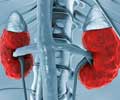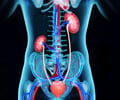Patients on dialysis and on the transplant wait list can look forward to a zero rejection treatment with the invention of the First ever Bionic Kidney.
Highlights:
- The procedure for the bionic kidney to be placed inside the body is done through a common surgical procedure
- It is made by silicon nanotechnology in the form of a microchip
- The rejection factor is zero
It is said that in two years time the World’s first Bionic Kidney would replace dialysis; the added advantage is that it would have a zero rejection factor. This is good news as it would be better than a donor’s kidney, as donor kidneys have rejections under certain circumstances. It is said that the bionic kidney would be the size of a coffee cup, which consists of numerous microchips which would be regulated by the heart. The procedure for the bionic kidney to be placed inside the body is like a regular surgical procedure. The function of the bionic kidney is similar to a normal kidney to filter out all the toxins from the blood. It balances the levels of sodium and potassium and regulates the blood pressure as well.
The microchip which is made by silicon nanotechnology is a process which is said to be similar to that of microelectronics in computers. The device has about 15 microchips constructed in layers. It has living renal cells which grow in and around the filters of the microchip which in turn acts like a living kidney.
One of the main challenges of this technique is to ensure there is no clotting while blood is being pushed through the device. A constant check on the device that there is no clotting or destruction of the device is guaranteed by using fluid dynamics which has been designed by Amanda Bucks, a Biomedical engineer.
The National Institute of health in 2015 funded this project with $6 million, which the scientists have tried to put to full use. It is said that human trails would commence only in 2018 due to current lack of funding.
The public that are either currently on dialysis or have a loved one in need of an organ are eagerly waiting for this new invention to change their lives.
Reference:
- VU Inside: Dr. William Fissell’s Artificial Kidney - (https://news.vanderbilt.edu/2016/02/12/vu-inside-dr-william- fissells-artificial-kidney/)
Source-Medindia
















